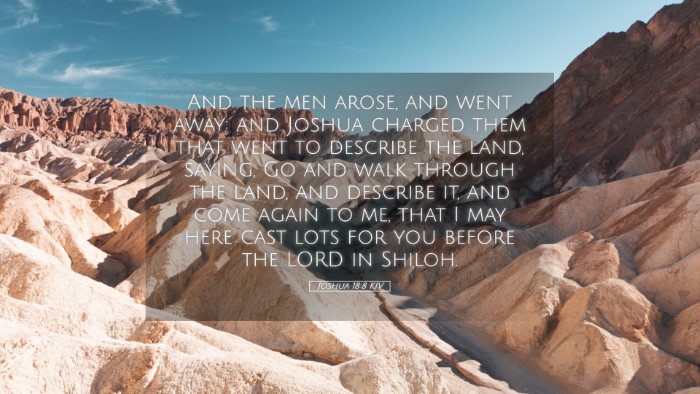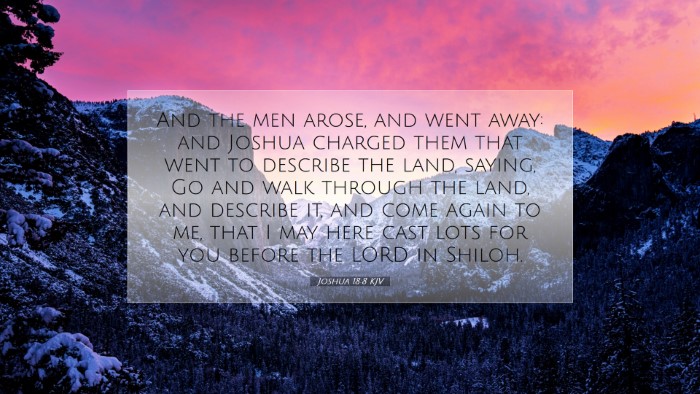Commentary on Joshua 18:8
Text of Joshua 18:8 (KJV): "And the men arose, and went away: and Joshua charged them that went to describe the land, saying, Go and walk through the land, and describe it, and come again to me, that I may here cast lots for you before the LORD in Shiloh."
Introduction
This verse captures a pivotal moment in Israel's history as they continue the process of dividing the Promised Land among the tribes. It emphasizes the roles of leadership, diligence in surveying the land, and dependency on divine guidance for discernment in distribution. Insights from various public domain commentaries such as those by Matthew Henry, Albert Barnes, and Adam Clarke will provide a rich theological and practical understanding of this text, suitable for pastors, students, theologians, and Bible scholars.
Context and Background
Joshua 18 occurs after Israel has conquered much of Canaan, and it becomes essential to determine how to allocate the land among the remaining tribes. The context indicates a transition from conquest to settlement, highlighting the importance of God's leadership through Joshua.
Key Themes
- Leadership and Responsibility: Joshua's instruction to the men reflects the responsibilities of leaders in ensuring that God's promises are fulfilled. His proactive approach emphasizes the need for careful planning and execution in God’s work.
- Divine Guidance: The act of casting lots symbolizes seeking God's will in decision-making. This reliance on divine guidance is a critical aspect of the Israelite culture and serves as a model for contemporary decision-making processes within the church.
- Active Participation: The command to "walk through the land" illustrates an active engagement with God's promises. The men were not to passively accept the land's distribution; rather, they were called to explore and understand it, showcasing the importance of personal responsibility in one’s spiritual journey.
Matthew Henry's Perspective
Matthew Henry highlights the significance of Joshua’s leadership. He emphasizes that the task given to the men was not merely administrative but spiritual, as it involved discerning God’s allocation of blessings. Henry points out that the act of surveying the land was essential for understanding what God had provided and ensuring that each tribe received its due inheritance. This surveying required diligence, as it involved examining both the physical and moral state of the land, suggesting that leaders must be aware of the surrounding context when making decisions about stewardship.
Albert Barnes' Insights
Albert Barnes draws attention to the phrase "that I may here cast lots for you before the LORD in Shiloh." Barnes interprets this as a clear indication that God was the ultimate decision-maker in the distribution of land. The lots represented a complete reliance on divine providence, and Barnes acknowledges that this process assured fairness in the inheritance allocated to each tribe, emphasized by the corporate nature of Israel's decision-making as they sought unity in their identity as God's chosen people. Furthermore, Barnes notes that the location of Shiloh becomes a significant religious center, as it signals God's presence among His people.
Adam Clarke's Commentary
Adam Clarke emphasizes the responsibilities of those sent to survey the land. He describes their mission as one of significant importance, underlining the essential nature of their task in establishing the boundaries and rightful claims of each tribe. Clarke stresses the need for those entrusted with such responsibilities to be diligent, wise, and faithful, reflecting the character of God in their work. He also draws parallels to contemporary Church leadership, where careful planning and seeking God’s will play a vital role in ministry and community leadership.
Theological Implications
The implications of Joshua 18:8 extend far beyond mere land distribution. The reliance on God’s guidance highlights a fundamental aspect of the covenant relationship between Israel and God. For modern readers, this underscores the importance of seeking God's will in all decisions, both personal and communal. Furthermore, the emphasis on surveying and understanding one's context can be applied to today’s ministry work, where cultural and societal factors play crucial roles in evangelism and outreach.
Practical Applications
- Leadership Development: As leaders, it is vital to engage in prayerful discernment and seek God’s direction when making decisions that impact the community.
- Faithful Stewardship: Believers are called to actively participate in God’s mission by understanding their context and being faithful stewards of the resources and opportunities given to them.
- Corporate Unity: Churches can draw from the corporate aspect of decision-making in this passage to ensure that all voices are heard and that they function as a unified body of Christ.
Conclusion
Joshua 18:8 serves as a powerful reminder of God's sovereignty, the importance of leadership, and the need for faithful stewardship. The insights from Matthew Henry, Albert Barnes, and Adam Clarke provide a comprehensive understanding of the text, enriching our knowledge and application of Scripture. As pastors, students, theologians, and Bible scholars engage with this verse, they are encouraged to reflect on how these ancient practices of surveying and seeking God’s direction can inform their present-day decision-making and community engagement.


